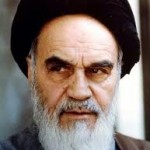ISIS & Western Guilt : Abolhassan Banisadr, former president of Iran
पश्चिम के राष्ट्रों ने पहले तो अस्सी देशों के लड़ाकों को इकट्ठा कर सीरिया से लड़ने के लिए तैयार किया . जब तक वह सीरिया की सरकार के खिलाफ लड़ रहे थे तब तक अच्छे थे जैसे ही उन्होंने रुख मोड़ा वह बुरे बन गए . वास्तव मैं जो इस्लामिक शिया धर्मान्धता अयातुल्ला खोमीनी ने ईरान मैं फैलाई थी ईसिस उन्हीं का सुन्नी रूपांतर है . ईरान के भूतपूर्व राष्ट्रपति का इंग्लैंड के गार्डियन मैं छापा यह लेख पढ़ें .
-
Abolhassan Banisadr, former president of Iran

- theguardian Monday 27 October 2014
Isis could not have emerged without support from western powers and their regional allies. These facilitated the travel of jihadis from 80 countries into Syria, funded them, and then trained and armed them. So long as these jihadis were committing crimes in Syria against Syrians and Assad’s regime (which, to be clear, bears responsibility for the ongoing disaster there), western governments turned a blind eye. After all, at the time Isis was doing the bidding of the same neoconservatives and liberal interventionists who had decided that the overthrow of Libya’s despot, Gaddafi, should be followed by the overthrow of Assad. This would then enable them to go for the main prize, the Iranian regime. However, Isis became a problem for the west when, following the pattern established by al-Qaida and the Taliban, they turned their guns against western interests in the region and tried to capture the oil fields of the Kurdish region, which was not part of the plan.
Although Isis is a product of the west’s policy of domination, it is also a Sunni version of Khomeinism. It was Ayatollah Khomeini who sanctified and glorified violence under the garb of religion, and the heinous crimes committed by his regime set precedents for Isis. These include the beheading of opposition leaders and others, the execution of prisoners and the injured (which, after the June 1981 coup against me, reached 300-400 a night and climaxed in 1988 when the regime executed more than 4,000 prisoners who had already been sentenced and were serving prison terms).
 Khomeini, Iran’s one-time supreme leader, implemented a doctrine of victory through terrorisation (al-nasro-be-rob), and his regime’s ideologue, Mesbah Yazdi, has said that “if violence is the only way of achieving the Islamic goal, then it is necessary to use it”. He also said that “if, in a place like the desert where the police are not accessible, and if somebody insulted God, the prophet and Islam, then the sentence [hokm] for insulting Islamic sacred is execution and if there is no possibility for a trial, then it is the duty of any Muslim to personally carry it out”. This is exactly what Al-Baghdadi, the leader of Isis, is doing.Needless to say that Khomeini could not justify his crimes with even one Qur’anic verse, and neither can Isis. I challenge them to cite a single verse from more than 6,600 in the Koran which tolerates, let alone permits, such savagery. From the Qur’an’s perspective, war is a Satanic act and peace and human rights are blessings – in contradiction to Khomeini’s (and his Sunni counterparts’) glorification of war and violence.
Khomeini, Iran’s one-time supreme leader, implemented a doctrine of victory through terrorisation (al-nasro-be-rob), and his regime’s ideologue, Mesbah Yazdi, has said that “if violence is the only way of achieving the Islamic goal, then it is necessary to use it”. He also said that “if, in a place like the desert where the police are not accessible, and if somebody insulted God, the prophet and Islam, then the sentence [hokm] for insulting Islamic sacred is execution and if there is no possibility for a trial, then it is the duty of any Muslim to personally carry it out”. This is exactly what Al-Baghdadi, the leader of Isis, is doing.Needless to say that Khomeini could not justify his crimes with even one Qur’anic verse, and neither can Isis. I challenge them to cite a single verse from more than 6,600 in the Koran which tolerates, let alone permits, such savagery. From the Qur’an’s perspective, war is a Satanic act and peace and human rights are blessings – in contradiction to Khomeini’s (and his Sunni counterparts’) glorification of war and violence.So, in the mirror of Isis, we can see the organic relation between Islamic fundamentalism and the exercise of western power. What, then, should be done?
Terrorism is a product of relations of domination. As long as such relations are not addressed, we can see no end to it. Isis is not an internal phenomenon of Syria and Iraq but an international one. The US, Europe, Turkey, Saudi Arabia, Qatar and other Persian Gulf Arab regimes are culprits in creating a monster that is now threatening their interests. The solution should thus also be sought in the collaboration of these players. At the moment, the Kurdish town of Kobani in Syria is under threat by Isis forces. Isis is not trying to annihilate them because of their religion, as they are Sunnis, but because it says that the Kurds are ethnically Iranians and therefore heretics. Here we are not observing religious cleansing as Isis inflicted on the Yazidis in Iraq, but ethnic cleansing nonetheless.
Turkey would prefer the town to fall as this would weaken the PKK and create the opportunity to pursue its unstated policy of reviving the Ottoman empire. The Assad regime wants the town to fall to Isis so it can march into the region and portray itself as an anti-terrorist champion and thus secure the survival of its regime. The US’s aim is to prop up the corrupt regimes of Saudi Arabia and other oil kingdoms. The Iranian regime wants to see the town fall so it can rescue the refugees and portray itself as a defender of the Kurdish people. In every case, then, we can see how national interest violates human rights and makes human life expendable.
However, we are also in one of those rare historical moments in which the defence of human rights does not contravene the national interest of any of these countries. All the countries involved in the disaster in Syria through which Isis has emerged and who are responsible for the present catastrophe need to get together and agree to stop funding and arming the parties involved. Turkey could close its borders to jihadis, and when all the funds and weapons have dried up, the UN could send a peace force to the country, made up of a combination of forces that have no interest in Syria. This would initiate not only the ending of one of the most brutal civil wars in the 21st century, but also reverse the gains of a violent so-called Islamic movement which seriously threatens even western societies. The Islamic world has an opportunity to educate itself in Islam as a discourse of liberty, which is defined by principles of human dignity and human rights
